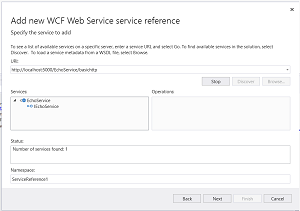News
Community Devs Revive WCF After Microsoft Deprecation
Windows Communication Foundation lives on, kinda.
Many Microsoft-centric developers were ticked off years ago when the company declined to port WCF -- a framework for building service-oriented applications -- from the old .NET Framework to .NET Core, suggesting gRPC as the way to go in the new open source, cross-platform order.
That decision in 2019 generated comments like:
- "So we get Java interop but no WCF. I would like to try what the folks planning this are smoking."
- "I don't understand the purposeful killing of WCF. It seems sadistic. They got us to buy in and make our apps rely on it, and now they're telling us we can't use it in the future, when our apps are already deeply tied to it."
- "This. Non negotiable. Give us WCF or forget it."
Shortly afterward, we reported on a community-driven effort to provide some semblance of the old WCF tech, if only in part. Called Core WCF, its initial code was donated by a Microsoft WCF team member, and it was sponsored by the .NET Foundation. "Core WCF is not intending to be a 100 percent compatible port of WCF to .NET Core, but aims to allow porting of many WCF contract and service implementations with only a change of namespace," the .NET Foundation said in a post at the time.
Today (April 28), a Microsoft blog post authored by Sam Spencer, a program manager on the .NET Core team, announced CoreWCF 1.0 (somewhere along the line, the name got shortened). Although Microsoft employees were involved, he noted that more commits actually came from the community, along with organizations such as Amazon Web Services (AWS). However, Microsoft will support the community project, depending upon the support status of the underlying .NET platforms. Microsoft said other organizations might also kick in some support.
The project's raison d'être hasn't changed: It's still not a full-blown replacement, being more of a bridging/modernization helper, while gRPC (remote procedure calls) is still Microsoft's go-to recommendation.
 [Click on image for larger view.] Adding a WCF Web Service service reference (source: Microsoft).
[Click on image for larger view.] Adding a WCF Web Service service reference (source: Microsoft).
"CoreWCF is intended for customers who have been using WCF on .NET Framework and need WCF support in .NET Core to facilitate modernizing the application," Spencer said. "While there is nothing stopping you from adopting CoreWCF in greenfield projects, we would recommend you consider more modern alternatives to SOAP such as gRPC. The sweet spot for CoreWCF is to make it easier to modernize server and clients that have a strong dependency on WCF and SOAP."
A reader provided a similar take in reply to a question asking how it compared to WCF -- Windows Communication Foundation Client Libraries: "The new CoreWCF library is a subset of the WCF code to help migrate WCF services to .NET Core/5/6. It is not full featured but rather is a stopgap to help get people off of .NET Framework. I don't believe MS'es position has changed at all on this though. They will still recommend switching to REST/gRPC services for a variety of reasons but for those cases where it is not practical to migrate then this new library can be used to at least build WCF services now. Before you had to stick with .NET Framework."
As a subset, it includes WCF features for:
- Http & NetTCP transports
- Security
- WSDL generation
- Partial configuration support including services & endpoints
- Extensibility (
IServiceBehavior and IEndpointBehavior) -- most extensibility is available
Not available in v1.0 are:
- Transports other than Http and NetTCP
- Message security beyond Transport & Transport with Message Credentials
- Distributed transactions
- Message Queueing
Regarding the first item in the above list, a GitHub Feature Roadmap Vote issue was set up in 2020 to help guide future development plans. As of this writing, the top vote-getter is "Transport -- NamedPipe."
About the Author
David Ramel is an editor and writer at Converge 360.